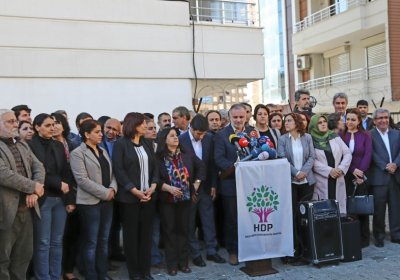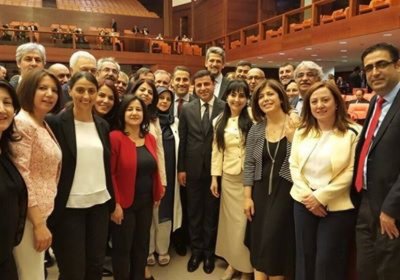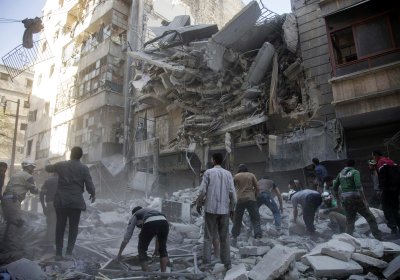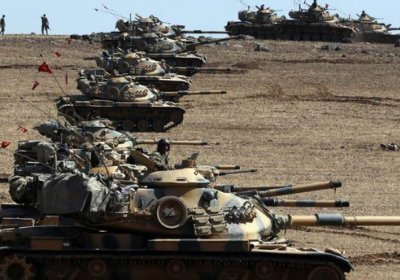On November 4, Turkish authorities issued arrest warrants for all 59 MPs of the Kurdish-based left-wing opposition Peoples Democratic Party (HDP). The party’s leaders, Selahattin Demirtaş and Figen Yüksekdağ, and several other MPs were taken into detention.
Turkey
The regime of Turkish President Recep Tayyip Erdoğan took a further leap towards undisguised dictatorship, intensifying its crackdown against the democratic and left-wing opposition, independent media and the Kurdish population.
On October 25, Co-Mayors of the Diyarbakır (Amed) Metropolitan Municipality, Gültan Kışanak and Fırat Anlı, members of the Kurdish Democratic Regions Party (DBP), were arrested.
BREAKING NEWS November 5 — The regime of Turkish President Recep Tayyip Erdoğan took a further leap towards undisguised dictatorship with the issue of arrest warrants for all 59 Peoples' Democratic Party (HDP) MPs by the Diyarbakir Chief Prosecutor's Office, Kurdish Question reported.
Thirteen HDP deputies including party leaders Selahattin Demirtaş and Figen Yüksekdağ have already been detained.
The crackdown by the Turkish regime of President Recep Tayyip Erdoğan against the democratic and left-wing opposition, independent media and the Kurdish population has intensified. On October 25, co-mayors of the the Diyarbakır (Amed) Metropolitan Municipality, Gültan Kışanak and Fırat Anlı, members of the Kurdish Democratic Regions Party (DBP), were arrested.
Free Women’s Congress (KJA) spokesperson Ayla Akat Ata was detained at a protest calling for Kışanak and Anlı's release and is now facing terrorism charges alongside them.
Iraqi Prime Minister Haider al-Abadi announced the start of an assault to recapture Mosul, the most important Iraqi city held by ISIS, on October 16.
The assault is spearheaded by the Iraqi army and the peshmerga, the armed forces of the Kurdistan Regional Government in northern Iraq. It also includes the Popular Mobilisation Units (PMU), an umbrella group of militia groups loyal to the Iraqi government and based in Iraq’s Shi’a Arab communities, and some other Iraqi militias.
Kurdish footballer Deniz Naki has been indicted by a Turkish court on “terrorist propaganda” charges for sharing posts on Facebook and Twitter about Turkey’s destruction of Kurdish cities and killing of civilians and militants.
Naki, who plays as a striker and playmaker for Kurdish team Amedspor, in Turkey’s Second League, will face up to five years in prison if found guilty. Amedspor are based in Diyarbakır, the unofficial capital of Turkish Kurdistan.
Another round of international talks on Syria, and a ceasefire, have come and gone. The five-and-a-half-year-old civil war continues unabated, as do the competing military interventions — all ostensibly targeting ISIS — by various regional and global powers.
The direct involvement of foreign powers in the conflict was significantly increased with the August 24 occupation by Turkey of the previously ISIS-controlled border town of Jarabalus and the surrounding area.
A large minority in Turkey, at about 20% of the population, the Kurdish people have long faced systemic discrimination by the Turkish state. This has included massacres and violent repression of their culture, with even the Kurdish language banned until recently.
Such oppression led to the Kurdistan Workers’ Party (PKK) launching an armed struggle for national liberation in 1984. In recent years, the PKK — whose leader Abdullah Öcalan remains in solitary confinement in a Turkish jail — has declared its commitment to a peaceful solution to the conflict.
A video showing Turkish soldiers and state-sponsored Kurdish village guards torturing and abusing Saime Avşin (Avaşin Gabar), a female Kurdistan Workers’ Party (PKK) guerrilla fighter, has surfaced on social media, Kurdish Question said on September 20.

Protest against Turkish invasion and massacre of civilians. Girkê Legê, Rojava, August 28.
The statement below was released on September 1 and signed by a range of politicians, academics and activists from around the world. To sign, please send your name, organisation and country to mc@kurdishinstitute.be.
* * *
- Previous page
- Page 13
- Next page










